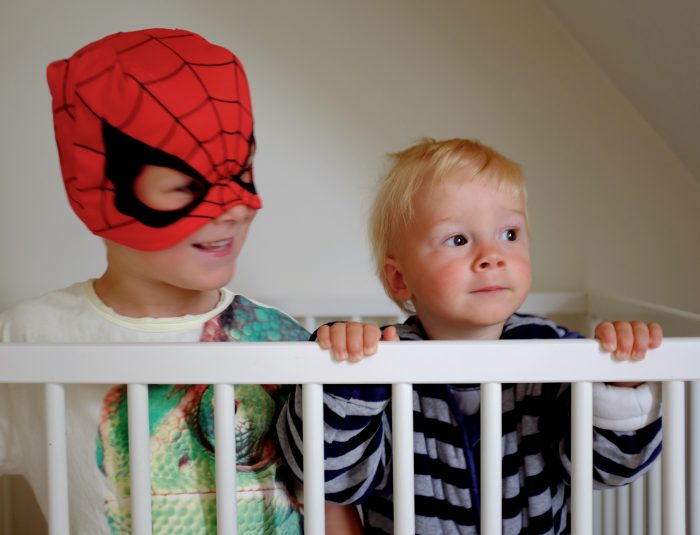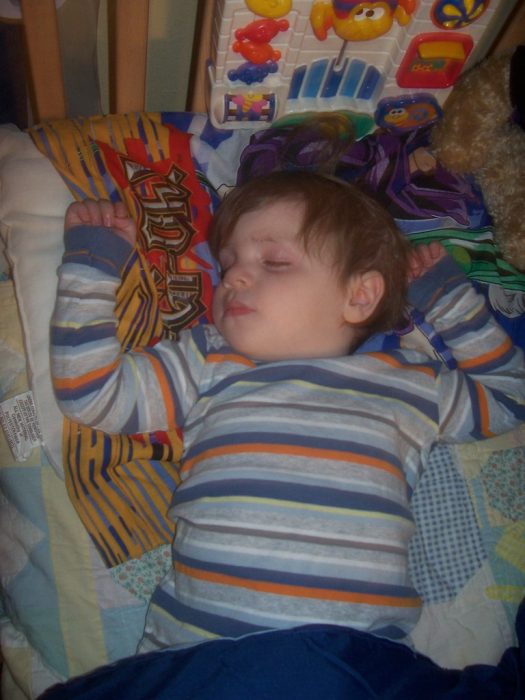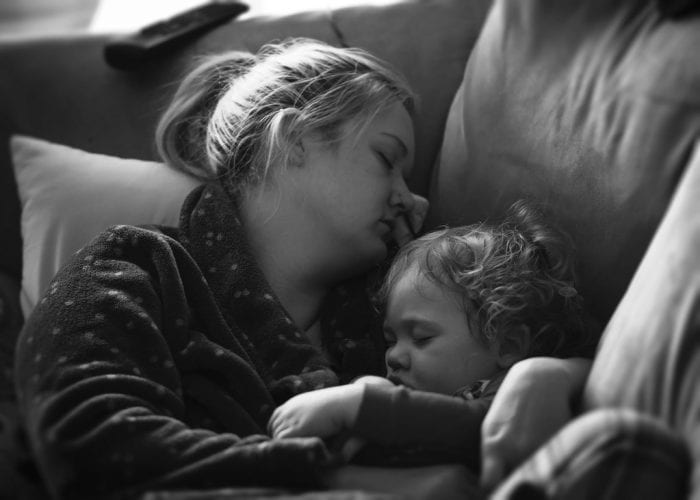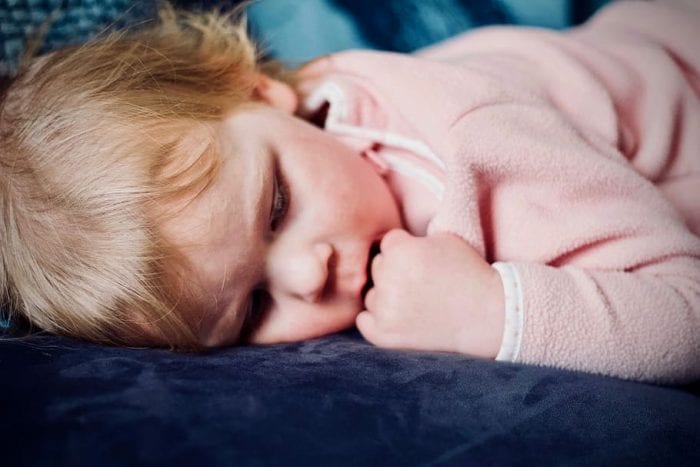Babies are indeed a blessing, but one problem that many parents face at their early stages is when they scream at night and wake everyone in the house up. Sleep-deprived parents who just want a full night’s rest are quite common.
However, you think it would go away with time, especially at 18 months. Your baby is a year and a half, so you figure they could sleep more independently. However, at 18 months, there may be a problem. This is known as the 18-month sleep regression. What is that? Let’s find out.

Sleep Regression
As your baby grows, their sleeping patterns as well. However, it’s not a straight line in evolution. Sometimes, it can take some steps forward, and then some steps back. This is known as sleep regression.
Sleep regression is when a toddler who was sleeping fine at first suddenly doesn’t want to. They may wake up and cry, will wake up frequently, or just not fall back asleep.
This is because a toddler’s brain is developing, and sometimes, this can affect how a baby sleeps. Your baby’s sleep schedule may reboot, disrupting their sleep and leading to some unhappy toddlers and even more unhappy parents. Sleep regressions can be due to other factors as well, such as stress, teething, a routine change, travel, and sickness.
Sleep regression is commonly seen in an 18 month old baby, and usually, sleep regression can be fixed with different tactics. You want your child to reach developmental milestones, but sometimes sleep regression can affect their bodies.

With sleep regression, their sleep patterns may change, and with sleep regression, it might affect toddler sleep during nighttime. Sleep patterns do need to be reinstated, and it can be a hard habit to put in.
If you’re familiar with these bedtime battles and struggling to get your child to sleep through the night, then reading about sleep regression probably makes sense to you. Sleep regression is a bit of a struggle for some children, and sometimes, with sleep regression, it can affect how a child performs when they’re awake. With improper sleep patterns, it can affect brain and body development, which is why understanding sleep regression is important.
With some instances of sleep regression, the sleep patterns and sleep problems are temporary. Some sleep regression is a result of new places. If your child is traveling to a new location with you, they might experience sleep regression when they’re in an unfamiliar place.
Sometimes, sleep regression is caused by separation anxiety and sleep. Separation anxiety can happen when a child starts to sleep in a new bed, and it can affect how they sleep through the night. Separation anxiety is a result of a change, and if you notice your child sleep differently, it might be slight cause for alarm, since sleep regression can affect their life. These bedtime battles might just be a result of your child wishing that you would stay with them when it’s bedtime. If your child wants you to stay in bed when you read them a story, there might be some cause for sleep regression there. But, you don’t have to deal with separation anxiety and sleep forever, there is always light at the end of the tunnel.
If your child is screaming at bedtime, or if they want to not sleep in the evening, it might be a symptom of sleep regression. Screaming at bedtime is usually a sign that they don’t want to sleep yet, and can be a sign that their sleep habits aren’t there. If you notice this, it might be a sign of sleep regression, since of course, with these changes, your child may want to stay up later.

Sleep is important to a toddler. At that age, the brain is growing, and by not sleeping, it can cause them growth problems. A toddler may sleep up to 14 hours a day. If an 18-month-old screaming fits at night, and he or she is not getting enough sleep may cause behavior troubles and mental health problems.
When does it end? It all depends on the child. Some sleep regressions end a few days to a few weeks after it becomes a problem. The time it ends can depend on the person, and how you handle it. If you handle it ASAP, you can reduce the amount of time it takes for your child to end sleep regression.
Stages of Sleep Regression
There are different stages of sleep regression, and different sleep regressions which can take place.
First, you’ve got four month sleep regression. During your four month sleep regression, you will notice your child sleep at different times, and maybe forgot naps. For the most part, four month olds start to show some rebelliousness to sleep, and their sleep problems start to come out. They may only want a few hours of sleep, and they’ll ditch the naps. You will notice your baby sleep less during night time, and sometimes, you will see your baby sleep inconsistently. Usually, four month old sleep regression doesn’t happen for the long term, but usually you will see your child sleep differently, and possibly start screaming at bedtime. Your six month old baby is learning how to sleep better, and usually this baby sleep problem is a result of them trying to work out their schedule, while these sleep regressions play a part.
Next, you will notice this in six month olds with six month sleep regression. This is usually sleep patterns attributed to growth spurts, and the hours of sleep they might be getting may be a result of their sleep regressions that are happening.
If you see your baby sleep inconsistently during then, this might be six month sleep regression. Sometimes though, six month sleep regression is mistaken with a growth spurt, since both of these do have sleep problems. But, if you’re not sure, sleep consultants can help. If you notice your toddler scream at bedtime, then there might be a sign that six month sleep regression is occurring.
Then there is eight month sleep regression, which of course is when sleep problems usually happen because there are developmental milestones there. you may notice the primary sidebar sleep regressions happen. During these primary sidebar sleep regressions, you will notice your baby sleep much differently. There may be more sleep regressions occurring since your toddler is much more active. At this point, you may want to consider letting them happen, as these eight month sleep regressions typically are a result of the changes that are happening in the body.
Nine month sleep regression and ten month sleep regression are quite similar, but with the baby moving around more, this can complicate matters. For most parents, when the 11 month sleep regression occurs, a lot of it begins to happen because the child begins to refuse naps. These sleep regressions usually are a result of the child attempting to learn to have a proper bedtime, but with these sleep regressions, it can be more complicated.
For the most part, these sleep regressions are a result of naps. But what does an 18 month sleep regression mean? Well this is when you notice the toddler screaming at bedtime, refusing naps, and the like. If you see your toddler screaming at bedtime, or even fighting you on naps, that’s a surefire sign that you are dealing with 18 month sleep regression. What’s the cause of 18 month sleep regression? At this point, usually with 18 month sleep regression, the sleep problems occur mostly when toddler sleep changes. If your toddler sleep patterns start to change, and you notice your toddler screaming at bedtime, more sleep disruptions, or trouble sleeping in the evening, there might be some sleep problems in place, and usually the solution is sleep training.

Finally of course, you have the 24 month sleep regression, or two year sleep regression. This is different from the other month sleep regression issues because usually toddler sleep is different because they’re learning how to function. Their sleep training is off because they’re learning potty training, and usually for 24 month sleep regression, part of it is associated with new habits.
A lot of sleep regression up to 18 month sleep regression is usually the result of issues with toddler sleep and baby sleep that come into place when learning throw to stay asleep. A six month old baby will struggle with sleeping because they’re unable to fall asleep at normal hours, or maybe the 10 month old baby is struggling with taking a nap. But, if you notice different month sleep regression pattens happening, do understand that unless it’s a problem for your baby, it is just something that happens.
18 month old sleep regression is the one that’s different because usually a toddler sleep schedule changes because the toddler is learning to be more self-reliant. And, if you notice your toddler sleep schedule changing, or maybe they’re screaming more at night, the primary sidebar reason is because of 18 month sleep regression.
Sleep is important to a toddler. At that age, the brain is growing, and by not sleeping, it can cause them growth problems. A toddler may sleep up to 14 hours a day. If an 18-month-old screaming fits at night, and he or she is not getting enough sleep may cause behavior troubles and mental health problems.
When does it end? It all depends on the child. Some sleep regressions end a few days to a few weeks after it becomes a problem. The time it ends can depend on the person, and how you handle it. If you handle it ASAP, you can reduce the amount of time it takes for your child to end sleep regression.
Handling Sleep Regression
If a toddler wakes up in the middle of the night and is throwing a fit, here’s what you can do.
- Keep A Wind-Down Routine
Winding down is always important when you’re trying to get your toddler to sleep. Give them a nice, relaxing bath before bedtime. Listen to some relaxing music with your toddler. Don’t eat too much before bedtime. If you notice your toddler sleep patterns changing, chances are you may have some patterns off, so make sure that they keep a routine.
- Keep Calm
This can be hard for some parents to do. You’re sleep-deprived, so you’re not your most rational. It’s easy to lose your temper and snap on the child, but that’s not something you should do. Instead, you should keep calm and try to comfort your child. Tell your child that everything is going to be okay, and try to rock them back to sleep. Usually, baby sleep happens with minimal sleep disruptions if you stay calm while you watch your baby sleep.
- Get Your Toddler Up A Little Bit
If your toddler keeps trying to fall asleep on the bed, they may start associating the bed with being awake. If your toddler can’t sleep, let them up around the house for a little bit and do some activities that keep them calm. Then, return them to the bed when they are tired again, and repeat if needed. If you notice baby sleep affecting them, such as they don’t want to take naps as much, don’t let them and help them get acclimated to a sleep schedule.
- Try Co-Sleeping
This is when the parents sleep with the toddler. A toddler being close to their parents may be able to help them sleep better at night. With that said, you do want to make sure this isn’t a habit. Sometimes, a toddler won’t want to sleep in their own bed ever again. However, they may often return to their bed soon. Usually baby sleep is done with co-sleeping because the parent is nearby, and this can help with baby sleep because this will help the baby sleep better, and they’ll feel more secure.

- Keep A Consistent Bedtime Routine
Being consistent is always a good thing. With both adults and kids, having a consistent bedtime routine can help fix your body’s internal clock. We know that sometimes you may go to bed a little earlier or later depending on the circumstances, but try to be as consistent as possible. This can help fix your child’s sleep schedule quite well. If you notice your baby sleep during certain hours more often than most, start to keep that sort of schedule, since it can help your baby sleep better, and it can keep them on a good schedule.
- Avoid Screens Too Close To Bedtime
If your toddler is watching TV or playing on a tablet too close to bedtime, this may be a problem, especially if you don’t have any blue light filters. Many people are having a hard time going to bed because of screens. The dopamine rush these can bring can keep you up at night. Try limiting the usage a few hours before bed. Usually, this can help with baby sleep, and with a toddler’s schedule because those screens, unless they have the blue light filter, will keep them up at night.
- Talk To A Counselor Or Therapist
If you’re still at a loss as to what you can do for your child, a sleep counselor or therapist may be able to help. There may be problems in your routine that causes your child to not be able to fall asleep. There may be problems in the child as well. Sometimes, your child may have a disorder or mental health problem preventing them from sleeping. Odds are, that’s not the case and they’re experiencing a normal part of toddlerhood, but as they say, better safe than sorry. They may help your baby sleep because they can get down to the root of the problem.
When To Go To A Doctor
It’s important to go to a doctor if your 18-month-old screaming fits at night. If the problem persists even without troubleshooting. Many toddlers may have sleep disorders when they grow older, and it’s important to nip it in the bud as it’s happening. A doctor may be able to help give your toddler some medicine to wind them down that’s non-habit-forming and can keep them sleep well through the night. The doctor can also help rule out any sleep disorders the toddler can have.
Sometimes, the solution is a sleep consultant. A sleep consultant will look at your child’s sleep schedule and environment, and the sleep consultant will help get to the root of why baby sleep isn’t helping them.
They may offer sleep training. A sleep consultant who offers sleep consulting and sleep training might be able to help with baby sleep in different ways. With sleep consulting, the sleep consultants will talk to your child, and these sleep consultants will figure out any patterns or changes to help baby sleep. They may put together some sleep training, or a custom sleep schedule to help your baby sleep.
If you notice your baby sleep patterns being off, or your baby sleep schedules being different and inconsistent, and you can’t get to the root, then consider sleep consultants.
This way, they can return to getting a great night’s sleep without having to worry about insomnia and all that jazz and you can have your baby sleep easily, and readily.
Insomnia and other sleep disorders are common, and they may start at a young age. By ruling them out, you can make sure that your toddler doesn’t develop one as they grow older. This will help your baby sleep soundly, and get them on a long-term schedule which will assist them.

Conclusion
It can be very frustrating dealing with a toddler who can’t sleep, but keep your cool. You will soon be on your way to better sleep and having a better time. Just make sure your toddler keeps sleeping well. By doing this, you can help your baby sleep soundly, and happily every night.
18 Month Old’s Screaming Fits At Night FAQs
Why do toddlers scream at night?
When your 18-month-old screaming fits at night wake up early, go in and check on him but don’t speak to him or try to comfort him. Your baby may be having night terrors that are similar to sleepwalking but are more dramatic.
Why is my 2 year old suddenly screaming at bedtime?
Stress and getting tired is a major trigger for night terrors. It usually occur in children from one to eight years old.
How do I stop my toddler from having tantrums at night?
When dealing with your child mid-tantrum, you should explain things to a child. Talk to your kids about the plan and have snuggle time with your Kids.

How long do night terrors last in toddlers?
A kid’s Night terrors are naturally harmless. Each episode will end on its own. The child will be able to fall back into a deep sleep again after that.
How can I get my toddler to sleep all night?
Good nighttime sleep for babies and toddlers is based on a parent-led bedtime routine as well as having a good sleep environment. A parent in charge of the bedtime routine is essential.
Is it okay to let a toddler cry themselves to sleep?
Most first-time parents often ruffle at the thought of allowing their young child to cry him or herself to sleep. However, this approach – while noisy – is perfectly healthy for children.
18 Month Old’s Screaming Fits At Night Other Resources
https://beewisesleepconsulting.com/18monthregression/\
https://www.healthline.com/health/parenting/baby-night-terrors
https://www.verywellfamily.com/your-toddler-s-18-month-sleep-regression-4159537
Last Updated on November 22, 2022 by Mary Cimeni
DISCLAIMER (IMPORTANT): This information (including all text, images, audio, or other formats on FamilyHype.com) is not intended to be a substitute for informed professional advice, diagnosis, endorsement or treatment. You should not take any action or avoid taking action without consulting a qualified professional. Always seek the advice of your physician or other qualified health provider with any questions about medical conditions. Do not disregard professional medical advice or delay seeking advice or treatment because of something you have read here a FamilyHype.com.